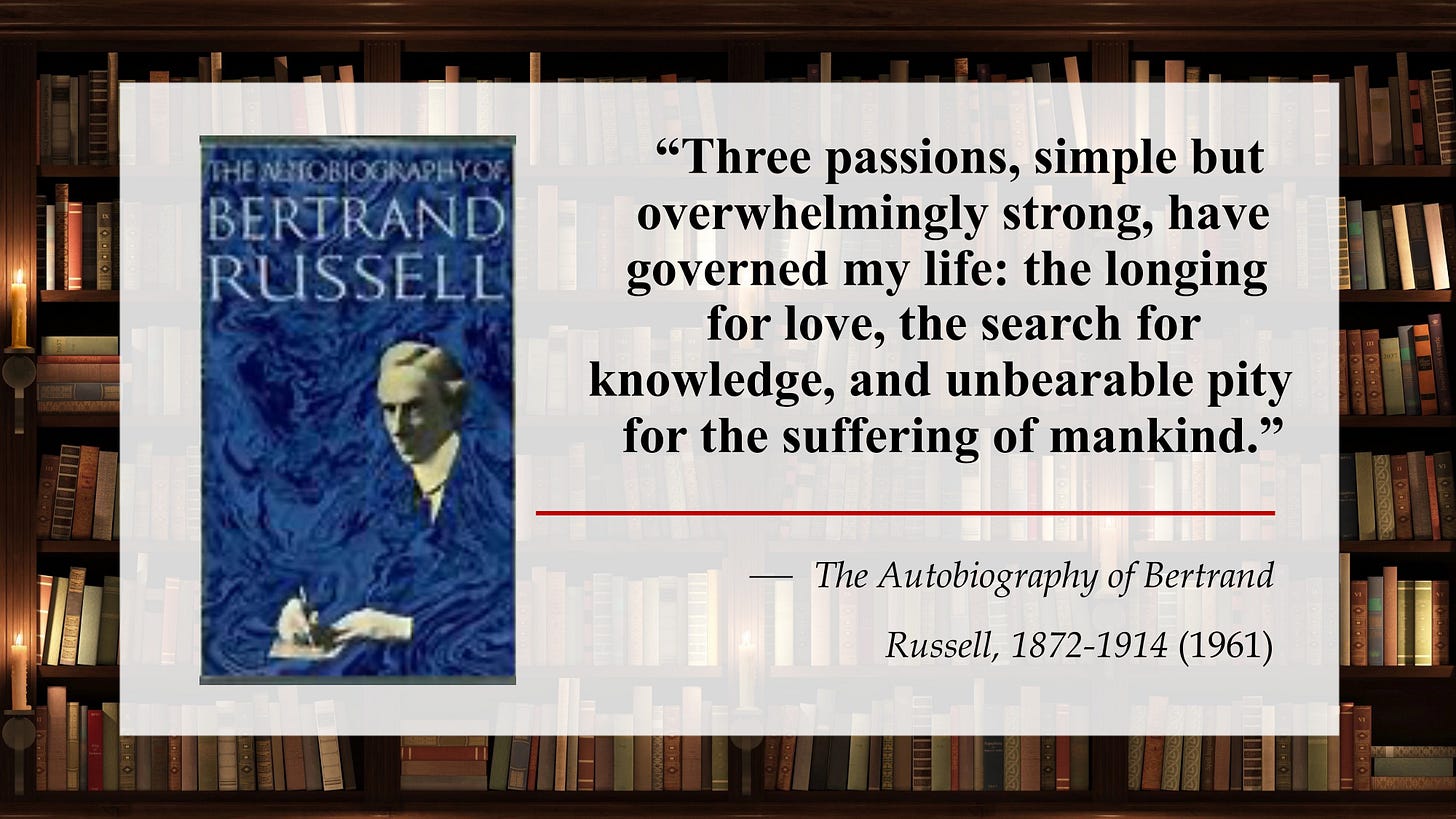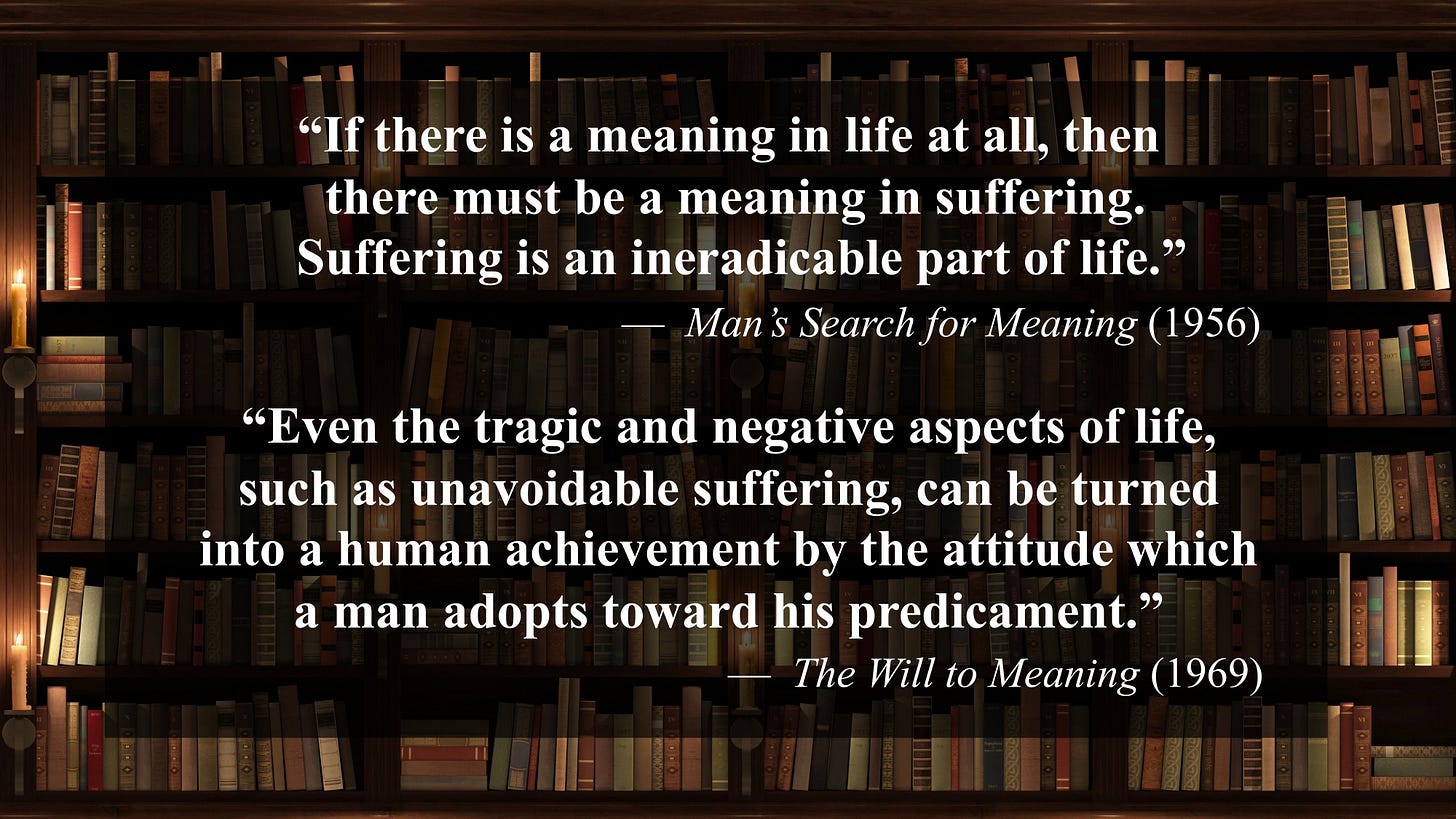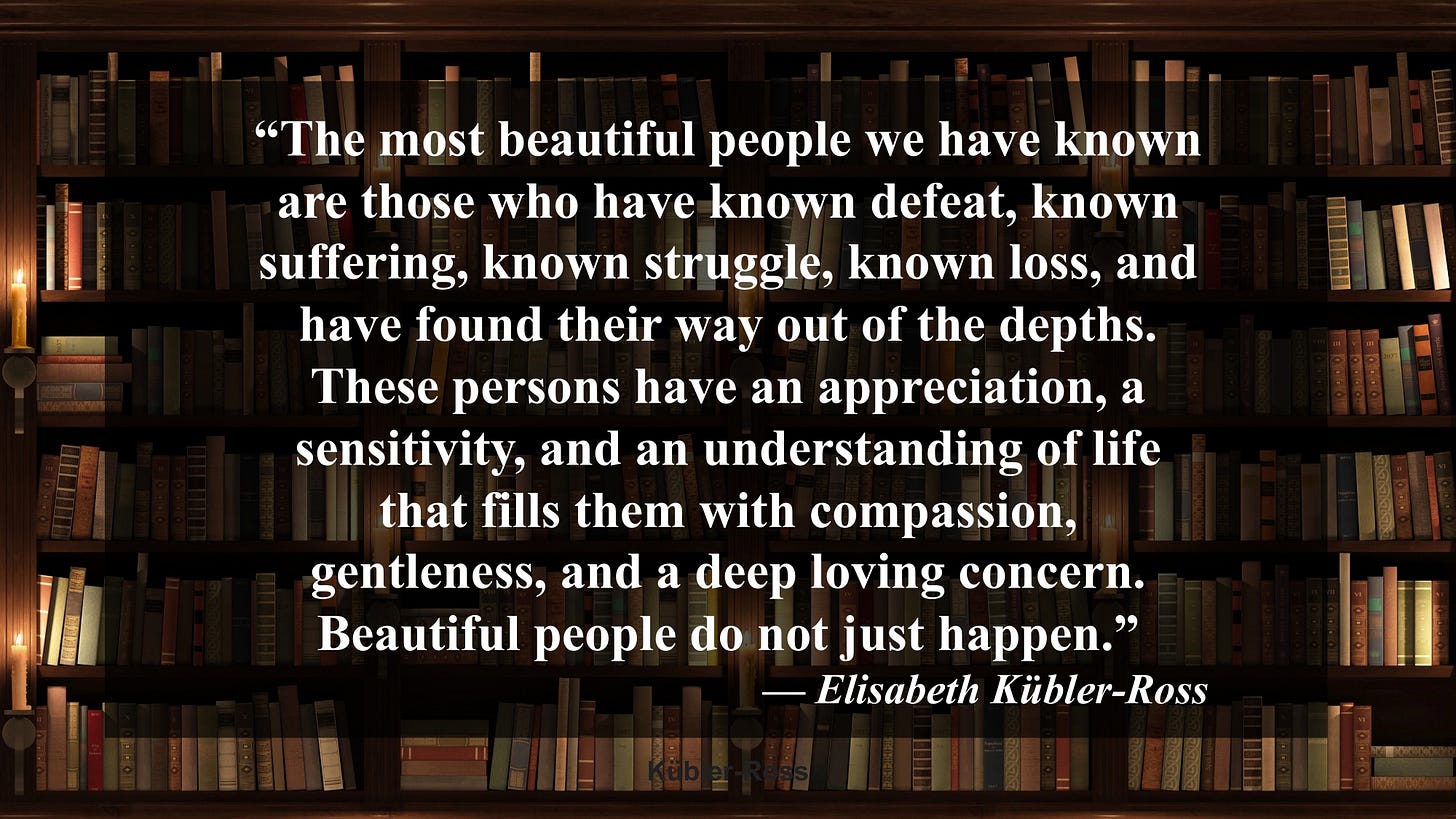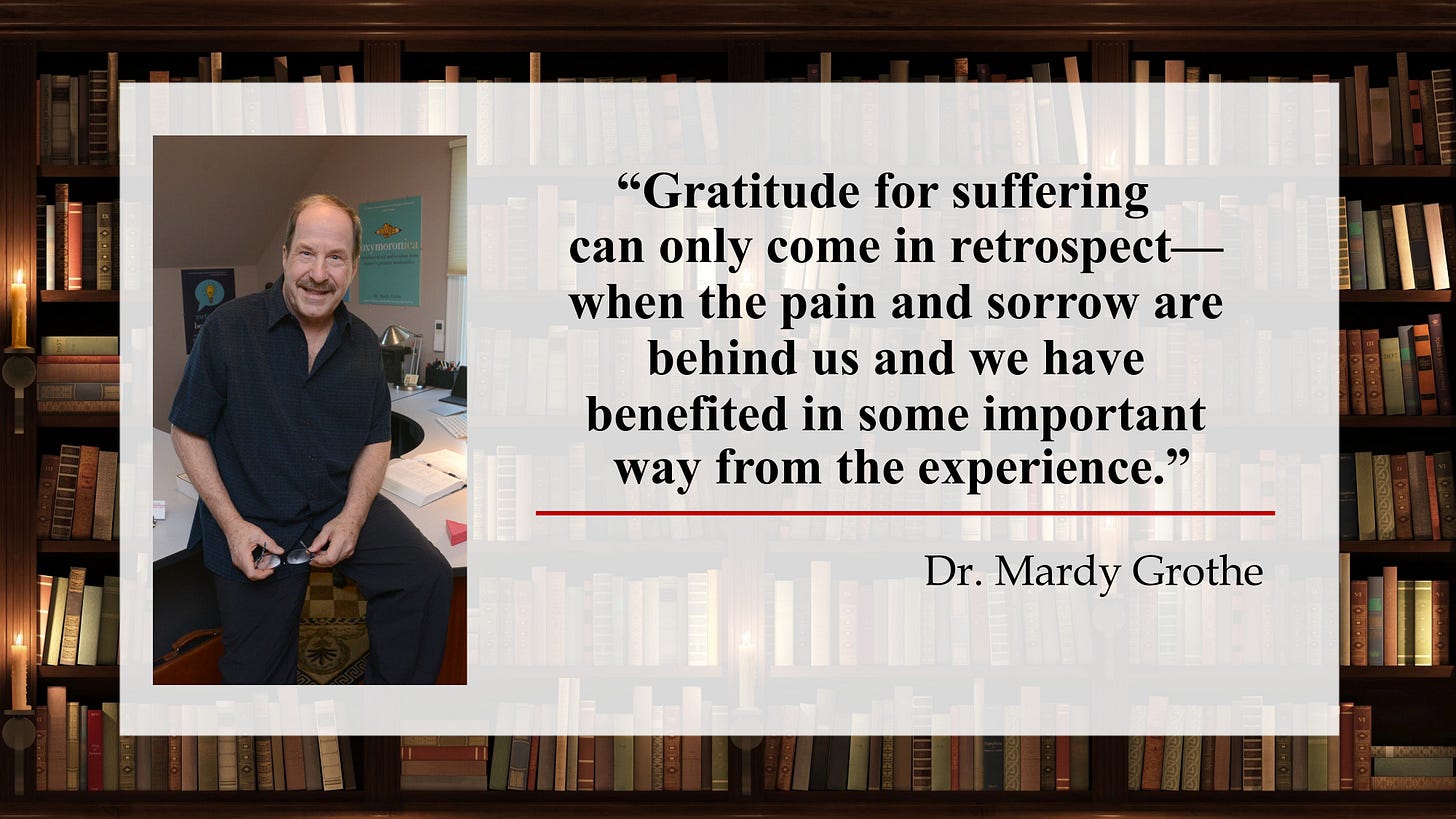Dr. Mardy's Quotes of the Week ("Suffering")
March 23-29, 2025 | THIS WEEK'S THEME: “Suffering"
Great Opening Line of the Week
In his opening words, Russell immediately draws readers in with a succinct—and emotionally compelling—summary of the three great driving forces in his life. In the book’s opening paragraph, he continued:
“These passions, like great winds, have blown me hither and thither, in a wayward course, over a deep ocean of anguish, reaching to the very verge of despair.”
For more than 2,000 memorable opening lines from every genre of world literature, go to www.GreatOpeningLines.com.
This Week’s Puzzler
On March 26, 1905, this man was born in a Jewish ghetto in Vienna. Growing up, he was an exceptional student who showed an early interest in the pioneering work being done by the Viennese physicians Sigmund Freud and Alfred Adler. After getting his own medical degree from the University of Vienna Medical School in 1930, he went on to become chief of the university’s neurology and psychiatry clinic.
In 1938, after Hitler’s takeover of Austria, it became clear that his future was in jeopardy. Unlike many of his intellectual friends, who fled to safer places around the world, he continued working with his patients in Vienna. It turned out to be a costly decision. In 1942, he, his wife, and his parents were transported to a Czechoslovakian concentration camp—and two years later, they were sent to Auschwitz, where his wife and parents perished.
In 1945, after Allied forces liberated the many Nazi concentration camps in Germany and surrounding countries, he put the finishing touches on a memoir about his experiences—and the experiences of his fellow prisoners—in the death camps. The original title of the book, written in German and published in 1946, was Saying Yes to Life in Spite of Everything: A Psychologist Experiences the Concentration Camp.
For the next decade, the book was moderately popular in Germany and Austria, but virtually unknown in the rest of the world. That all changed in a dramatic way in 1956, when it was published in English under the title Man’s Search for Meaning (interest in the book was stimulated by a moving Introduction written by the respected Harvard psychologist Gordon W. Allport). The book quickly became an international best-seller, and the little-known Viennese psychiatrist was soon being hailed as one of modern psychology’s most influential figures.
When he died at age 92 on September 2, 1997, he was one of the world’s most famous psychologists, the founder of a new branch of psychotherapy—called logotherapy—and the author of more than 30 books. Man’s Search For Meaning alone sold more than 16 million copies in more than 50 languages.
This week’s Mystery Man was also a highly quotable figure, offering memorable observations on countless subjects, including these:
Who is this person? (Answer below)
The Benefits of Suffering: Reality Versus Romanticization
The American Heritage Dictionary (AHD) defines suffer as “To feel pain or distress; sustain injury or harm.” The words suffer and suffering both derive from the Latin sufferre, meaning “to bear, carry, or endure,” as we see in phrases like “to bear a burden” or “to endure a hardship.”
In my view, though, the AHD definition fails to capture the true nature of suffering, for the condition connotes considerably more than pain or distress. Suffering—and especially deep suffering—cannot be fully understood without factoring in its close relationship to agony, anguish, despair, and torment.
Knowing this, it’s a little surprising that, since ancient times, suffering has been praised as something that, while painful, can be of great benefit to people.
For more than 2,500 years, suffering has been depicted as a crucible for personal transformation, responsible for helping people become stronger, wiser, and more enlightened. The two quotations above certainly fit into this tradition. As do the quotations in this week’s Puzzler. And, of course, the legendary quotation below:
And so does the following observation—from a woman who spent a lifetime examining the suffering associated with loss and grief:
In a 1939 speech at Princeton University, the novelist Thomas Mann took things a step further when he argued that suffering also deserved our gratitude:
I’ve celebrated quotations like these for decades because they speak volumes about the resiliency of the human spirit and the capacity of people to triumph over adversity.
But then, as I was working on this week’s post, something unexpected happened. A question popped into my mind: For every person who emerges from desperate circumstances with a newfound sense of meaning and purpose, how many people in the same situation perished? Just like that, I saw things in a new way.
You Can’t Thrive If You Don’t Survive
While deep suffering clearly has the potential to benefit people, it also has the power to destroy them—and a strong case can be made that, over the long course of history, suffering has annihilated far more people than it has elevated. Consider, for example, the Holocaust. Or the great Plague. Or history’s many famines and wars. Or apartheid in South Africa. Or extreme poverty. In all of these instances, for every individual who survived and managed to find meaning in their suffering, an untold number of others—and, clearly, a far larger number—perished in agony and despair.
In my opinion, the view that suffering has transformative powers is shaped by two things: our long fascination with heroic figures and what we might call survivorship bias. Throughout history, people are far more likely to have heard stories of those rare individuals who endured hardship and prevailed than those who were silenced—literally and figuratively—by their suffering.
History reveres figures like Nelson Mandela, who endured 27 years of brutal imprisonment and emerged with a vision of reconciliation in his heart, or this week’s Mystery Man, who survived the Nazi death camps to become one of the century’s most influential psychologists. But what about the millions of their compatriots who suffered and perished without ever having a chance at finding redemption? Their stories, though just as real, do not fit the romantic narrative so many people prefer to hear.
Let me bring my remarks to a close by stressing that none of what I’ve said this week is meant to take anything away from people who’ve persevered over the most dreadful circumstances and forged a life of purpose and meaning. They are true heroes, and should be regarded as such. But the next time you see a quotation like this one. . .
. . . make sure you give most of the credit to the jockey and not the horse.
This week, take a few moments to reflect on the role that suffering—your own as well as that of others—has played in your life. As usual, let your thinking be stimulated by this week’s compilation of quotations on the subject:
When suffering knocks at your door and you say there is no seat for him, he tells you not to worry because he has brought his own stool. — Chinua Achebe
You desire to know the art of living, my friend? It is contained in one phrase: make use of suffering. — Henri-Frédéric Amiel
When pain is over, the remembrance of it often becomes a pleasure. — Jane Austen
You read something which you thought only happened to you, and you discover that it happened 100 years ago to Dostoevsky. This is a very great liberation to the suffering, struggling person, who always thinks that he is alone. — James Baldwin
Out of suffering have emerged the strongest souls; the most massive characters are seamed with scars. — E. H. Chapin, in Living Words (1866)
ERROR ALERT: This exact quotation, but with seared instead of seamed, was mistakenly attributed to Kahlil Gibran in The Treasured Writings of Kahlil Gibran (1995). Ever since, almost all quotation anthologies have repeated the error.
The saddest thing in life and the hardest to live through is the knowledge that there is someone you love very much whom you cannot save from suffering. — Agatha Christie
We feel and weigh soon enough what we suffer from others; but how much others suffer from us, of this we take no heed. — Thomas à Kempis,
I do not believe that sheer suffering teaches. If suffering alone taught, all the world would be wise, since everyone suffers. To suffering must be added mourning, understanding, patience, love, openness and the willingness to remain vulnerable. — Anne Morrow Lindbergh
Man is the more man–that is, the more divine–the greater his capacity for suffering, or rather, for anguish. — Miguel de Unamuno
Don't look forward to the day you stop suffering, because when it comes you’ll know you're dead. — Tennessee Williams
For source information on these quotations, and more observations on the theme of SUFFERING, go here.
Cartoon of the Week:
Answer to This Week’s Puzzler
Viktor Frankl (1905-1997)
Dr. Mardy’s Observation of the Week
Thanks for joining me again this week. See you next Sunday morning, when the theme will be “Ignorance in Action.”
Mardy Grothe
My Two Websites: www.drmardy.com and www.GreatOpeningLines.com
Regarding My Lifelong Love of Quotations: A Personal Note













Mardy, another insightful post on suffering and its unexpected benefits. Two more perspectives on suffering come from Zen Buddhism. “The only problem that ever exists is not accepting things the way they are. This is the cause of all suffering.” Zen author Chris Prentiss boldly says: “Everything happens for a reason, and the reason is so you can be benefited. No exceptions.” But, as you pointed out, for a vast number of people, their pain and suffering leads not to growth but to death.
Suffering is an incredibly deep topic so thank you for the post Mardy. I read through all of the quotes on your website on the subject of suffering and appreciated the many varied points of views.
My personal thoughts are aligned to Buddhism’s premise that the path to liberation from suffering and the attainment of lasting happiness lies within the realm of the mind.